Tim Walker's Blog, page 16
February 23, 2016
The Great EU Coin Flip
“Never, in the field of human history, has so little been known by so many about something so important,” is what Winston Churchill might have said, should he have lived to see the political shambles that now surrounds us. In the run-up to the June 23rd British referendum on whether we remain a member of the European Union, or choose to leave, we will be assailed with lots of opinions and thinly disguised threats, but few facts, to raise our stress levels to Critical, as we are asked to vote on a leap into the unknown – on the social, political and cultural direction our country should take.
 Okay, maybe I shouldn’t be gloomy about this. It is always exciting to pack for a journey into the unknown, except you don’t really know what to pack. Better to travel light, like Frodo Baggins heading off for the adventure of a lifetime and to save his world from the forces of evil. It could be fun, but are we collectively up to the challenge of forging a new identity on our wind-swept rock off the north-west coast of Europe? Geographically speaking, we can’t leave Europe, and should we vote to leave the EU our nearest neighbours – France and Ireland – will still be member states. So there can be no dramatic, “I’m off then!” followed by a slamming of the door. We aren’t going anywhere, and in the event of an exit, will have to talk to (and try to trade with) grumpy neighbours whom we have chosen to reject. No one can say, categorically, how they will take it. Yes, trade may go on, as money tends to find a way of multiplying in the hands of capitalists, but they may choose to reject us. Make an example of us. After all, we would be rejecting their great post-War European peace and integration project.
Okay, maybe I shouldn’t be gloomy about this. It is always exciting to pack for a journey into the unknown, except you don’t really know what to pack. Better to travel light, like Frodo Baggins heading off for the adventure of a lifetime and to save his world from the forces of evil. It could be fun, but are we collectively up to the challenge of forging a new identity on our wind-swept rock off the north-west coast of Europe? Geographically speaking, we can’t leave Europe, and should we vote to leave the EU our nearest neighbours – France and Ireland – will still be member states. So there can be no dramatic, “I’m off then!” followed by a slamming of the door. We aren’t going anywhere, and in the event of an exit, will have to talk to (and try to trade with) grumpy neighbours whom we have chosen to reject. No one can say, categorically, how they will take it. Yes, trade may go on, as money tends to find a way of multiplying in the hands of capitalists, but they may choose to reject us. Make an example of us. After all, we would be rejecting their great post-War European peace and integration project.
 You see, I’m already saying it – Them and Us. Shouldn’t I be saying, ‘OUR great post-War peace and integration programme?’ And here lies the problem. Because we occupy an island, suspicious of our mainland neighbours, who at various times during our violent history have sent armies to invade and generally make our lives a misery (and vice versa), we don’t really feel a part of their club. We were not defeated and occupied during World War II, and we all survived the Cold War, so we remain bullish in the face of security threats, whereas our European mainland neighbours are more worried about history repeating itself and internal tribal feuds boiling over into messy wars. For them, the EU is a necessity, and is seen as a major reason why relative peace (aside from the Balkans re-adjustment, and Russian aggression in the east) has prevailed over the past 70+ years.
You see, I’m already saying it – Them and Us. Shouldn’t I be saying, ‘OUR great post-War peace and integration programme?’ And here lies the problem. Because we occupy an island, suspicious of our mainland neighbours, who at various times during our violent history have sent armies to invade and generally make our lives a misery (and vice versa), we don’t really feel a part of their club. We were not defeated and occupied during World War II, and we all survived the Cold War, so we remain bullish in the face of security threats, whereas our European mainland neighbours are more worried about history repeating itself and internal tribal feuds boiling over into messy wars. For them, the EU is a necessity, and is seen as a major reason why relative peace (aside from the Balkans re-adjustment, and Russian aggression in the east) has prevailed over the past 70+ years.
 The OUT campaigners will say that our security is assured by our membership of NATO, and as long as we stay pals with the USA, then they will back us up in a fight. We hope… Remember what happened in 1940? Churchill begged President Rosevelt for help to resist German invasion. Instead, he pointed out that he had to campaign for re-election, and the will of the American people was against getting involved in a messy war in Europe. But he did agree to sell us 40 of their oldest war ships, in return for territories in the Pacific. Thankfully, we were able to hold out until the Americans eventually turned up in 1944. At least then, the British Empire had something to offer in exchange for assistance. What do we have now? I’m prepared to discard security as a major factor in the vote, as I accept that our NATO membership is more important than being linked to a flimsy and dis-trusted EU defence force.
The OUT campaigners will say that our security is assured by our membership of NATO, and as long as we stay pals with the USA, then they will back us up in a fight. We hope… Remember what happened in 1940? Churchill begged President Rosevelt for help to resist German invasion. Instead, he pointed out that he had to campaign for re-election, and the will of the American people was against getting involved in a messy war in Europe. But he did agree to sell us 40 of their oldest war ships, in return for territories in the Pacific. Thankfully, we were able to hold out until the Americans eventually turned up in 1944. At least then, the British Empire had something to offer in exchange for assistance. What do we have now? I’m prepared to discard security as a major factor in the vote, as I accept that our NATO membership is more important than being linked to a flimsy and dis-trusted EU defence force.
 Secure our borders! A major reason to vote to leave. Will it work? No! It will make little difference, and no one is even willing to discuss the favoured politics of growing a large unskilled international labour pool. This horse has well and truly bolted. Britain has changed dramatically since the time of Margaret Thatcher, where the class warriors of the Conservative Party (aided by Blair’s New Labour) came up with a fiendishly clever plan to undermine the emancipated working class by simply by-passing them. They had become troublesome to business owners with their demands for fair pay and insistence on safety in the workplace. Too many holidays and too well paid. How can a greedy capitalist ever afford an island in the Carribean?
Secure our borders! A major reason to vote to leave. Will it work? No! It will make little difference, and no one is even willing to discuss the favoured politics of growing a large unskilled international labour pool. This horse has well and truly bolted. Britain has changed dramatically since the time of Margaret Thatcher, where the class warriors of the Conservative Party (aided by Blair’s New Labour) came up with a fiendishly clever plan to undermine the emancipated working class by simply by-passing them. They had become troublesome to business owners with their demands for fair pay and insistence on safety in the workplace. Too many holidays and too well paid. How can a greedy capitalist ever afford an island in the Carribean?
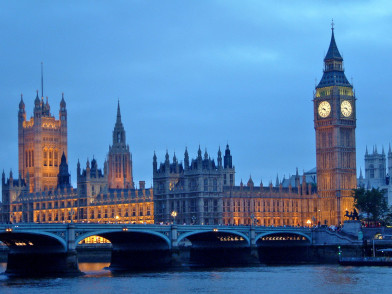 No, let’s replace them with eager and desperate foreigners, easily exploited and less likely to cause trouble. With over 10 million recent settlers from Commonwealth and European countries now living and working in the UK, this debate has already been decided. An OUT vote will not lead to settlers being thrown out, nor stop those living here from continuing to send for their friends and relatives, unless there is a major downturn in our economy. Infact, for what remains of the British working class, a vote to leave the EU will see their slim work prospects diminish even more, their cost of living go up, and they’ll be driven further into the arms of exploitative, greedy right-wing capitalists who will continue to control the political agenda. Sorry guys, you’re already screwed. Better stay in the EU where there is some social policy to protect you.
No, let’s replace them with eager and desperate foreigners, easily exploited and less likely to cause trouble. With over 10 million recent settlers from Commonwealth and European countries now living and working in the UK, this debate has already been decided. An OUT vote will not lead to settlers being thrown out, nor stop those living here from continuing to send for their friends and relatives, unless there is a major downturn in our economy. Infact, for what remains of the British working class, a vote to leave the EU will see their slim work prospects diminish even more, their cost of living go up, and they’ll be driven further into the arms of exploitative, greedy right-wing capitalists who will continue to control the political agenda. Sorry guys, you’re already screwed. Better stay in the EU where there is some social policy to protect you.
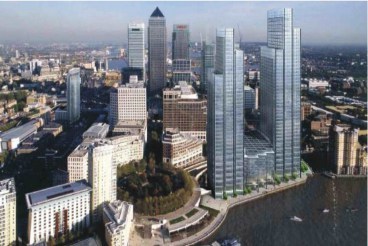 And that, ladies and gentlemen, is what it all boils down to. Forget security, immigration, the rise in the cost of living, Herman Van Rumpouy’s cheesy grin, Angela Merkel’s pudding basin haircut and nylon trousers. These things are distracting window displays. This vote is all about how you want to be governed – your vision of the future. A vote to leave pushes us away from European integration, but towards Britain being a haven for tax-dodging corporations, bankers, traders, cash-rich dictators, oil barons and the Chinese. The current political trend of stripping away our personal freedoms will be accelerated. In time, we will no longer be citizens at all, just a multi-cultural amorphous body of serfs, working for a pittance for your lord and master. Furthermore, leaving the EU will almost certainly lead to the break-up of the Union, with the remaining states looking even more puny and insignificant on the world stage. We will be bullied into accepting unfavourable conditions of trade and suffer shortages, whilst the wealthy elite will continue to feather their nests and pass on all cost increases to us, the powerless consumer. EU legislation holds this process in check, or at least up for scrutiny.
And that, ladies and gentlemen, is what it all boils down to. Forget security, immigration, the rise in the cost of living, Herman Van Rumpouy’s cheesy grin, Angela Merkel’s pudding basin haircut and nylon trousers. These things are distracting window displays. This vote is all about how you want to be governed – your vision of the future. A vote to leave pushes us away from European integration, but towards Britain being a haven for tax-dodging corporations, bankers, traders, cash-rich dictators, oil barons and the Chinese. The current political trend of stripping away our personal freedoms will be accelerated. In time, we will no longer be citizens at all, just a multi-cultural amorphous body of serfs, working for a pittance for your lord and master. Furthermore, leaving the EU will almost certainly lead to the break-up of the Union, with the remaining states looking even more puny and insignificant on the world stage. We will be bullied into accepting unfavourable conditions of trade and suffer shortages, whilst the wealthy elite will continue to feather their nests and pass on all cost increases to us, the powerless consumer. EU legislation holds this process in check, or at least up for scrutiny.
So here it is…the last and most important fight for your freedom. Don’t be misled into believing you will share in a liberating independence outside of EU membership. Your personal freedoms and quality of life will diminish. EU citizens will still have rights and the protection of the law long after ours have gone. There are no grounds to believe things will get better. Quite the reverse. Political opportunists will thrive on fear of the unknown, and we risk getting sucked into poverty and oppression. Don’t risk it… vote to stay IN.


February 19, 2016
GET SOME HEALING
My year started waiting for an operation date. Finally, in early February, it came. All other plans are on hold until I get through a complex and risky surgical procedure. On the morning of Friday 12th February, 2016, I lay in a bed on the Specialist Surgery Ward at the John Radcliffe Hospital in Oxford, waiting to be called to the operating theatre.
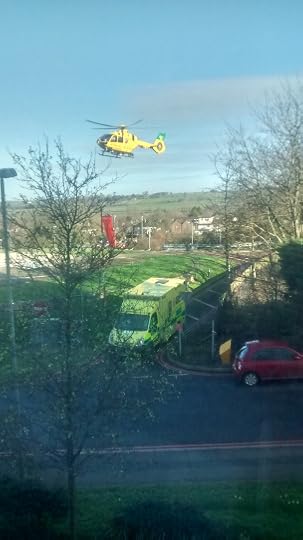 It was a beautiful morning, weather-wise, with bright blue sky over the green farmland hills in the distance. In the foreground is a heli-pad, where I watched a Thames Valley Air Ambulance crew land and transfer a patient to a waiting ambulance. Someone else’s life balancing on a thin thread. I can’t praise the emergency service staff enough. They are true heroes in an age of selfishness and greed.
It was a beautiful morning, weather-wise, with bright blue sky over the green farmland hills in the distance. In the foreground is a heli-pad, where I watched a Thames Valley Air Ambulance crew land and transfer a patient to a waiting ambulance. Someone else’s life balancing on a thin thread. I can’t praise the emergency service staff enough. They are true heroes in an age of selfishness and greed.
A plastic surgeon and a neurosurgeon come in to brief me on my procedure. It is to remove infected bone and tissue from my cranium. The Plastic Surgeon will deal with lifting the skin flap on top of my head, exposing the infected bone, which will then be cut away with the assistance of the neurosurgeon, whose primary function is to prevent any fatal contact with the brain . They will then send samples for analysis, attempt to identify the type of infection, and then make a treatment plan. Simples. I can expect to be in theatre for up to four hours. How do I feel about it? Well, not thrilled, but I know it is necessary as I have been living with a slowly worsening infection in my skull for 10 months. I can do little else but sign the consent form and put my faith in their hands.
Another air ambulance helicopter arrives, and another still patient is removed and I reflect once more on my mortality, hanging by a thin thread, in the hands of practiced health professionals, hoping they find a familiar problem they can easily correct. I can have a sip of water at 10.30 and then nothing. Fasting until it’s over, knowing that I’ll come to in a recovery ward, feeling groggy, thick tongue, and, as the anaesthetic slowly wares off, a throbbing headache. They intend to keep me in for a week on an intravenous antibiotic drip, to try and flush all vestiges of infection out of my system. During this time they will be getting results on the nature of my infection from analysis of cultures in the laboratory. Modern medical science is a marvel of human ingenuity and endeavour. They cannot be praised highly enough. I know I’m in good hands…
Panic over. I survived. Yes, I woke up in a bed in my own room, my head pounding with pain. Slightly spaced-out after the general anaesthetic, the words of a favourite song running through my head:
Flying, but I know I’m not coming down,
You’re trying, but I can’t be found,
All my colours turn to brown,
All my colours turn to clouds.
(Zimbo by Echo & the Bunnymen)
I became aware of a tube attached to my head wound, it is draining off excess fluid – blood and bile – and I have a kind of colostomy bag that I have attached to me. I’m typing this on the Tuesday after the Friday afternoon procedure. Saturday was a day spend in bed, not moving, on a drip. I had a catheta rod up my penis, and when I asked the nurse to remove it the pain was excruciating. It still hurts five days on when I take a pee. Hospitals are no fun for patients.
The surgeons came to see me on Saturday and declared it a success. They took off the bandages and took some photos. I asked them to take some pics on my phone. They explained they had successfully identified the infected bone and removed it, the neurosurgeon doing the delicate excision without coming into contact with the major artery that runs above the brain. Horray! This leaves me with a hole in the skull, which they covered with the skin flap. No grafting was done. The bad news is, they will have to go in again in a month or so, once they are sure the infection has gone, and put a moulded inplant into the hole to give the cranium some solidity.
 My mind wanders to near-death experiences – a car crash in Zambia, and the time I was chased by a hippo whilst canoeing on the Zambezi… but I managed to distract myself from morbid reflections. I know I must keep my mind occupied, try and stay positive, to stop falling into morose self-pity and general gloominess. I listened to music on my i-pod. I watched TV programmes on my Kindle. Free wi-fi is a godsend. Patients have the option of using hospital television for a fee. I paid for Saturday and Sunday to watch the international rugby and football highlights, but stubbornly refused to pay thereafter. My sisters, their partners and my brother all visit on Sunday, bearing gifts of fruit juice and cereal bars…plus some chocolate!
My mind wanders to near-death experiences – a car crash in Zambia, and the time I was chased by a hippo whilst canoeing on the Zambezi… but I managed to distract myself from morbid reflections. I know I must keep my mind occupied, try and stay positive, to stop falling into morose self-pity and general gloominess. I listened to music on my i-pod. I watched TV programmes on my Kindle. Free wi-fi is a godsend. Patients have the option of using hospital television for a fee. I paid for Saturday and Sunday to watch the international rugby and football highlights, but stubbornly refused to pay thereafter. My sisters, their partners and my brother all visit on Sunday, bearing gifts of fruit juice and cereal bars…plus some chocolate!
After a few days the pain settled down into something like nagging discomfort. Still taking my full allowable quota of painkillers every six hours – paracetamol and codeine. My head hurts less when I sit up, I’ve come to realise. After four days the drip tube is removed from my head, as the drip of blood and bile has finally dried up. This is liberating, as I no longer have to carry my colostomy-type bag around with me. The drips continue and they butcher my arm with repeated failed attempts to find a vein that will take the catheta. I sit in the armchair in the mornings, after showering, looking out of the window at the helipad and cemetery behind. Convenient. Time to waste, if it’s possible to waste time. I’m on treatment and in recovery, so don’t even think about editing my book. Rest!
My consultant surgeon visits, and tells me I’m healing well. Results are still coming in from the lab and they will soon make a treatment plan. He can’t say how long I’ll be here. I ask him for his take on the problems with the NHS. He says it has become too big and unwieldy, and reform is needed. He admits that it is going through a painful process of being run down by the Government as a precursor to privatisation. This, he feels, is inevitable, and not unwelcome. He see this hospital in the near future being run by a private company, like Virgin Healthcare, with a mix of private and NHS patients. It is a painful but necessary process, in his view.
I ask about staff. Less than one in four nursing and support staff are British or Irish. He smiles, and says they are currently recruiting in Portugal. There is a friendly, youthful and extremely helpful team on my ward coming from a variety of European and Commonwealth countries – Poland, Italy, Spain, Portugal, India, Pakistan and South Africa. Good for them – they’re getting experience that many will take back to their countries. Britain is committed to capitalism, and cheap labour can come from any country. This is exploitation, thinly disguised as something positive – multi-culturalism. No one cares about the consequences, as long as the rich get richer. They can afford private healthcare, in any country in the world, so the National Health Service, the last thing that makes Britain ‘Great’, is seen as an expensive inconvenience. But I’m still here, in defiance of smiling assassin, Jeremy Hunt, the Health Secretary.
Communication can sometimes be an issue, but on the whole, things seem to work. It concerns me that the nursing profession is now seen as being an unattractive career option to young British people, due to (comparatively) poor pay and long unsociable hours. Am I alone in worrying that the country is losing a generation of health workers – and many other skill areas for that matter – as we passively accept the dictates of international capitalism? Finding cheap labour from wherever to undercut local workers may be financially rewarding for corporations, but surely we are helping to dig a huge pit into which our independence, cultural identity and personal development prospects are being dumped?
There’s a hole in my head where the rain comes in is a line from a song, but which one? Songs about holes in the head include, Hole in the Head by Sugarbabes, and by Cypress Hill. Another Hole in the Head by Nickleback, but that’s not what I’m trying to remember. Is it in King of Pain by Sting? My search engine says Rhianna, Foreign Tongues, Dixie Chicks and Human Radio all sang about a hole in the head. Most along the lines of, “I need you around like I need a hole in the head.”
But I’ve heard it somewhere, if only I can find it. If only I can remember… is it Heaven by Psychedelic Furs? No. That’s, ‘hole in the sky’. Ah ha! I’ve got it… Evil Woman by Electric Light Orchestra:-
There’s a hole in my head where the rain comes in,
You took my money and played to win…
Relief! Hate that – when you’re trying to remember something but can’t, and online searches are of scant help. After all, there’s a hole in my head, and the rain would undoubtedly come in if I walked outside the building. Better stay in.
Just read in today’s (18/02/16) BBC News highlights another scare story marking the crumbling of our National Health Service. “More than 1,000 NHS patients in England in the past four years have suffered from medical mistakes.” Yikes! Should I be reading this in hospital? These ‘never events’ include a man who had a testicle removed instead of a cyst, a woman having her fallopian tubes removed instead of her appendix, wrong leg, knees and eyes being operated on, and hundreds of cases of objects such as scalpels being left inside bodies during operations. An NHS England spokesperson valiantly tried to defend the indefensible by playing it down. These ‘never events’ only occur in 1 in every 20,000 cases. There are 4.6 million operations a year in NHS England. Well, that’s one lottery I’m pleased to have lost. Oh, they’re going to set up a Task Force to investigate and make recommendations! That’s alright, then.
Is there a general dumbing-down of professional standards going on? Part of the degradation of the NHS prior to full privatisation? They would never admit to it.


February 7, 2016
Devil Gate Dawn
Devil Gate Dawn is a near-future thriller set in 2026 UK (with a USA sub-plot). King Charles III is head of an interim government and Trump America is in full swing, as anti-austerity demonstrations have brought western countries to a tense stalemate. Against this back drop George Osborne, an early retiree, must battle terrorists in a bid to save his family and western civilisation!
February 4, 2016
Devil Gate Dawn
Dear followers,
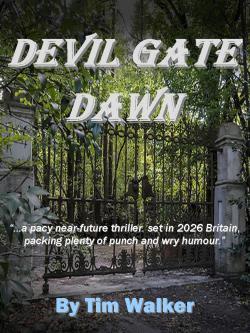 My first novella, Devil Gate Dawn, is almost ready after a careful proofread and copyedit.
My first novella, Devil Gate Dawn, is almost ready after a careful proofread and copyedit.
The blurb describes it as, “…a pacy near-future thriller set in 2016 Britain, packing plenty of punch and wry humour.” King Charles III is head of an interim government, and over in the USA Trump America is in full swing… against this backdrop, recent retiree George battles terrorists to save his family and his country.
The book weighs in at about 50,000 words. I’m looking for volunteers to read and review it prior to launch. I can send it to you as a pdf file. Please email me at timwalker1666@gmail.com if you are up for the challenge! Max three week turn around time, please! I reserve the right to choose the reader group.


February 1, 2016
The Revenant Reviewed
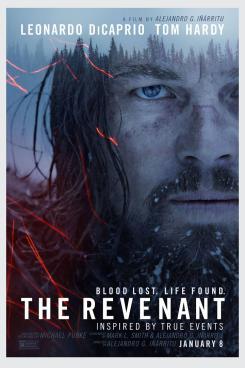 Just been to watch The Revenant at the cinema… here’s what it’s about:-
Just been to watch The Revenant at the cinema… here’s what it’s about:-
‘While exploring the uncharted wilderness in 1823, legendary frontiersman Hugh Glass (Leonardo DiCaprio) sustains injuries from a brutal bear attack. When his hunting team leaves him for dead, Glass must utilize his survival skills to find a way back home to his beloved family. Grief-stricken and fuelled by vengeance, Glass treks through the wintry terrain to track down John Fitzgerald (Tom Hardy), the former confidant who betrayed and abandoned him.’
Yup, that’s the official blurb. It is beautifully filmed, totally engaging, with confident and accomplished editing (always a relief), solid script (apart from the French guy referring to the English as ‘Americans’ – surely a bit early for that?) and great surround sound effects. The two main actors are brilliant – Di Caprio has nothing more to prove after his performances in The Wolf of Wall Street and this epic movie, and Tom Hardy is superbly chilling as the over-talkative baddie. The film tries and succeeds to portray the grim, bitter and dangerous wilderness, where men are men and women, well, shouldn’t really be there!
I think it should do well in the film awards in technical categories – cinematography, best picture, direction, soundtrack etc. di Caprio and Hardy could also be recognised.
It is unremittingly grim, and has a European feel to it, due no doubt, to the influences of Director Alejandro González Iñárritu, and cinematographer Emmanuel Lubezki. Watch it, but be warned, it is cruel and violent, with characters constantly looking over their shoulders for pursuers in a three-way battle between English, French and Native Americans.
January 25, 2016
When the Roman Left Britain…
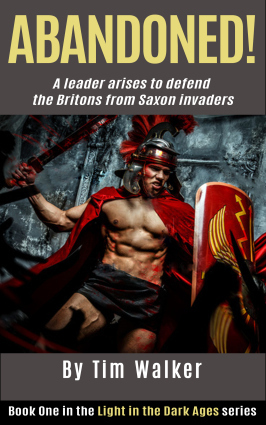 Following useful feedback from a reader’s group, I have made some changes and ironed out a few glitches to my long short story, ABANDONED! A revised version is now available to download from amazon kindle at the derisory price of £0.99 or equivalent in other amazon territories.
Following useful feedback from a reader’s group, I have made some changes and ironed out a few glitches to my long short story, ABANDONED! A revised version is now available to download from amazon kindle at the derisory price of £0.99 or equivalent in other amazon territories.
It is part one of an intended trilogy called, A Light in the Dark Ages. I’ve started working on part two, under the working title Uther’s Dilemma, which should be out some time in March 2016. It’s loosely based around the idea that King Arthur must have had a grandfather!* Dating of the Arthurian legend places King Arthur as a warrior king fighting Saxon invaders at the end of the fifth century, possibly about 50-60 years after the Romans abandoned their province of Britannia (sorry, Clive Owen!).
My story, Abandoned! is set in a Roman town at the time the last Roman legion pulled out of Britain, at around 420-440 AD. My character, Marcus Aquilius, is entirely fictitious, and I have him as the father of Aurelius and Uther. Aurelius Ambrosius is an historical figure who is thought to have led an army of ‘national unity’ at around 500AD to victory over a Saxon army at the battle of Badon Hill. His brother, Uther Pendragon, fights at his side. The problem is, no one knows exactly where or when this famous battle took place.
There are few surviving written records of events, and archaeologists continue to look for clues. This obscure period in English history remains partly hidden behind the mists of time, leaving it, for now, in the realm of myths and legends. Uther Pendragon is the supposed father of King Arthur, and the Arthurian legend was mostly written several hundred years later. It is based on stories handed down, a strong legend that refused to go away, and has some resonance with the dark historical events of that time.
*I read somewhere that the supposed father of Aurelius was the Roman Emperor Constantine, fighting in Gaul to defend a shrinking Western Roman Empire…not in my story! What is fact and what is legend?
New revised version now up on amazon kindle…ABANDONED! (Light in the Dark Ages Book 1) https://www.amazon.co.uk/dp/B019D64AH0
Download the free kindle app from amazon to read on any device.


January 11, 2016
Watch “Talking Thames Valley Tales” on YouTube
January 9, 2016
An Historical Trip Down the River Thames
Great start to the new year with my guest blog post on the English Historical Fiction Authors blog site…
http://englishhistoryauthors.blogspot.com/2016/01/an-historical-trip-down-river-thames.html
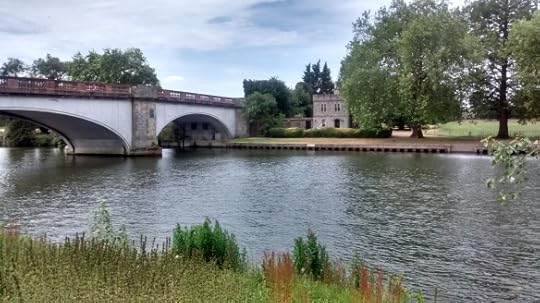

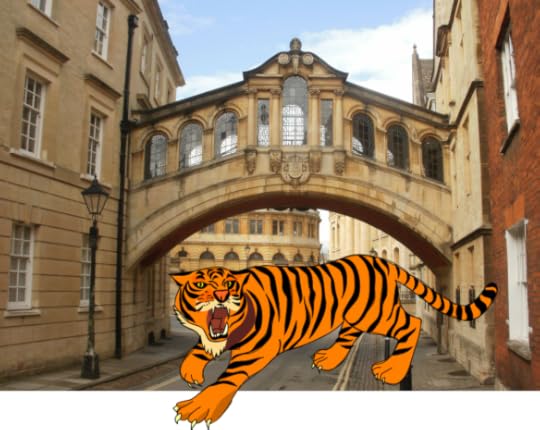


December 30, 2015
2015 in review
The WordPress.com stats helper monkeys prepared a 2015 annual report for this blog.
Here’s an excerpt:
A San Francisco cable car holds 60 people. This blog was viewed about 1,700 times in 2015. If it were a cable car, it would take about 28 trips to carry that many people.
Click here to see the complete report.


December 15, 2015
ABANDONED!
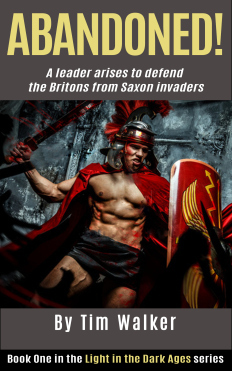 This started as a short story but it took on a life of its own and grew and grew, finally reaching its end at over 13,000 words. This makes it a literary hybrid – too long for a short story, and too short for a novella. However, it does qualify as a Kindle Short, defined as: “compelling ideas expressed at their natural length.” I’ll take it! Furthermore, I’m starting to feel my way into a generational series of shorts, as I‘m increasingly drawn to the patchy history of this period in English history. The Romans left and the Angles, Saxons, Jutes, Scotti and Picts invaded, precipitating a bloody and destructive slide into a Dark Age. This, therefore, is part one of the Light in the Dark Ages series.
This started as a short story but it took on a life of its own and grew and grew, finally reaching its end at over 13,000 words. This makes it a literary hybrid – too long for a short story, and too short for a novella. However, it does qualify as a Kindle Short, defined as: “compelling ideas expressed at their natural length.” I’ll take it! Furthermore, I’m starting to feel my way into a generational series of shorts, as I‘m increasingly drawn to the patchy history of this period in English history. The Romans left and the Angles, Saxons, Jutes, Scotti and Picts invaded, precipitating a bloody and destructive slide into a Dark Age. This, therefore, is part one of the Light in the Dark Ages series.
The early part of the Dark Ages is a period of myths and legends, most notably King Arthur and his knights. It is the realm of archaeologists and sleuth-historians looking for clues to what actually happened during the time before the commencement of The Anglo-Saxon Chronicles, a written record dating from the reign of King Alfred (871-899). This makes it rich territory for historical fiction writers, who can build fanciful tales around the few known facts, events and characters. From the 900s, the Dark Ages became less dark and more grey as European Kings came under the influence of the Roman Catholic Church; learning and record-keeping improved, although it remained a period of wars, grinding poverty and pestilence until the fifteenth century.
The idea for this story came to me during a visit to the site of what was once the Roman town of Calleva Atrebatum in Hampshire, south of Reading. The site, maintained by English Heritage, is a square patch of grass surrounded by the remnants of an earth bank. The Romans defeated the local Celtic/Briton tribe, the Atrebates, and built their town on the site of the existing settlement from around 50 AD. The Romans clearly wanted to keep the locals ‘on side’ and so named their new fortified town after the tribal name of their new subjects, perhaps hinting at a desire for conciliation, assimilation and cooperation – a theme that resonates with our own age of one-world multi-culturalism (rubbing uncomfortably against the forces of tribalism). One day, around 440 AD, the Roman garrison packed up and marched away, leaving those remaining to organise and defend themselves. Was this liberation or abandonment?
Download now from amazon kindle for just £0.99 / $0.99
http://www.amazon.co.uk/gp/product/B019D64AH0
http://www.amazon.com/gp/product/B019D64AH0
available worldwide from all amazon territories…









